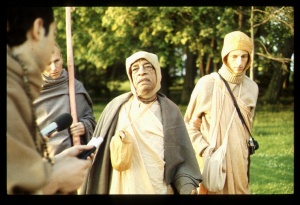CC Adi 12.35: Difference between revisions
No edit summary |
(Vanibot #0054 edit - transform synonyms into clickable links, which search similar occurrences) |
||
| Line 17: | Line 17: | ||
<div class="synonyms"> | <div class="synonyms"> | ||
''īśvarera'' | ''[//vanipedia.org/wiki/Special:VaniSearch?s=īśvarera&tab=syno_o&ds=1 īśvarera]'' — of the Supreme Personality of Godhead; ''[//vanipedia.org/wiki/Special:VaniSearch?s=dainya&tab=syno_o&ds=1 dainya]'' — poverty; ''[//vanipedia.org/wiki/Special:VaniSearch?s=kari’&tab=syno_o&ds=1 kari’]'' — establishing; ''[//vanipedia.org/wiki/Special:VaniSearch?s=kariyāche&tab=syno_o&ds=1 kariyāche]'' — has done; ''[//vanipedia.org/wiki/Special:VaniSearch?s=bhikṣā&tab=syno_o&ds=1 bhikṣā]'' — begging; ''[//vanipedia.org/wiki/Special:VaniSearch?s=ataeva&tab=syno_o&ds=1 ataeva]'' — therefore; ''[//vanipedia.org/wiki/Special:VaniSearch?s=daṇḍa&tab=syno_o&ds=1 daṇḍa]'' — punishment; ''[//vanipedia.org/wiki/Special:VaniSearch?s=kari’&tab=syno_o&ds=1 kari’]'' — giving him; ''[//vanipedia.org/wiki/Special:VaniSearch?s=karāiba&tab=syno_o&ds=1 karāiba]'' — shall cause; ''[//vanipedia.org/wiki/Special:VaniSearch?s=śikṣā&tab=syno_o&ds=1 śikṣā]'' — instruction. | ||
</div> | </div> | ||
Latest revision as of 18:21, 19 February 2024

A.C. Bhaktivedanta Swami Prabhupada
TEXT 35
- īśvarera dainya kari’ kariyāche bhikṣā
- ataeva daṇḍa kari’ karāiba śikṣā
SYNONYMS
īśvarera — of the Supreme Personality of Godhead; dainya — poverty; kari’ — establishing; kariyāche — has done; bhikṣā — begging; ataeva — therefore; daṇḍa — punishment; kari’ — giving him; karāiba — shall cause; śikṣā — instruction.
TRANSLATION
“But he has made the incarnation of Godhead a poverty-stricken beggar. Therefore I shall punish him in order to correct him.”
PURPORT
To describe a man as an incarnation of God, or Nārāyaṇa, and at the same time present him as poverty-stricken is contradictory, and it is the greatest offense. The Māyāvādī philosophers, engaged in the missionary work of spoiling the Vedic culture by preaching that everyone is God, describe a poverty-stricken man as daridra-nārāyaṇa, or “poor Nārāyaṇa.” Lord Caitanya Mahāprabhu never accepted such foolish and unauthorized ideas. He strictly warned, māyāvādi-bhāṣya śunile haya sarva-nāśa: (CC Madhya 6.169) “Anyone who follows the principles of Māyāvāda philosophy is certainly doomed.” Such a fool needs to be reformed by punishment.
Although it is contradictory to say that the Supreme Personality of Godhead or His incarnation is poverty-stricken, we find in the revealed scriptures that when the Lord incarnated as Vāmana, He begged some land from Mahārāja Bali. Everyone knows, however, that Vāmanadeva was not at all poverty-stricken. His begging from Mahārāja Bali was a device to favor him. When Mahārāja Bali actually gave the land, Vāmanadeva exhibited His all-powerful position by covering the three worlds with three steps. One should not accept the so-called daridra-nārāyaṇas as incarnations, because they are completely unable to show the opulence of the genuine incarnations of God.